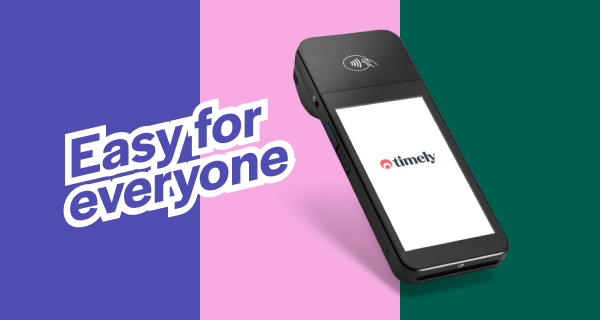Barbers need to ditch walk ins in 2020
Charles Clarke is much more than a world-renowned barber; he’s also a business owner, educator, and industry pioneer. We chatted to Charles about his journey, the challenges the barber industry is facing, and the need for an appointment booking system to protect the safety of your clients and staff, and take barber businesses into the future.
How did you get into barbering?
I’ve been in the industry for 31 years! I started in the industry when I was 15, straight from school. I always had quite a good academic record in school, and my parents wanted me to go into computers and technology, but barbering was calling to me.
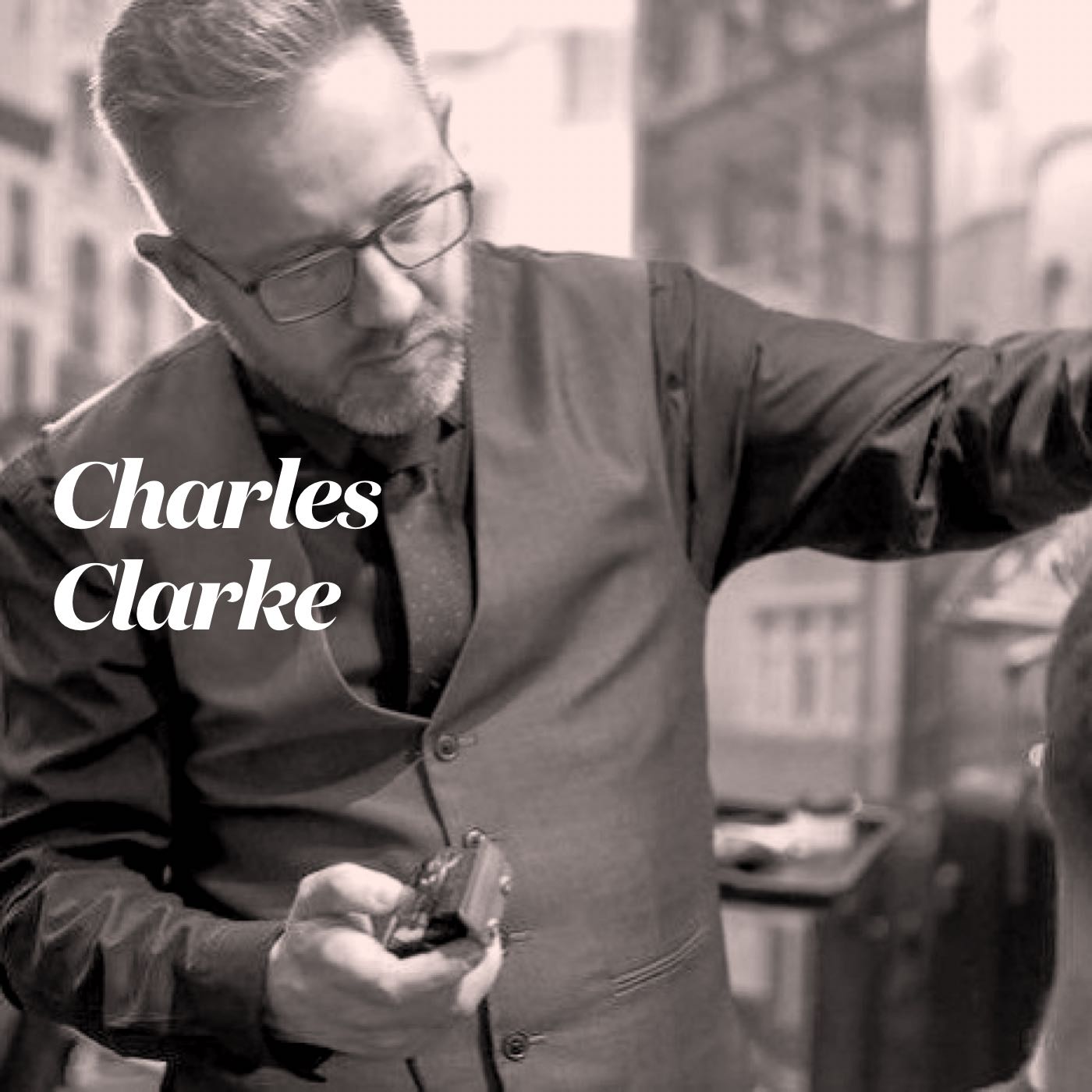
I got my first job with a guy called David Hoy, who trained me up. He taught me everything he knew, but he was pretty old school; it was very basic barbering. When I was 19, I started working in one of the most upmarket walk-in barber salons in Belfast with Ted Johnson, who’s still a very good friend of mine. Ted taught me how barbering should be done. He showed me it was more like gents hairdressing and hairstyling, and we were using hair dryers and tools that most barbers never used.
Tell us about your journey to owning your own salons
I’ve had quite a few salons over the years. At one point I had six salons, with 27 staff! I opened my first salon in 1998 on Good Friday, which was also the historic day that Northern Ireland had signed the peace deal! In my own salon, I did things differently from other barbers, and I quickly got a name for being professional, and very quick. At the moment I have one salon, and I’ve just trained my beautiful wife as a barber, so she’ll be working with me. We plan to open another salon at some stage that she’ll lead, hopefully within the next year or two.

How did you get into barber education?
Owning my first salon led me into the Belfast Institute of Further and Higher Education, which is now Belfast Met. They asked me to start teaching their barbering class, which got my foot in the education door.
I did my Level 5 Education and Training qualification, then my Level 4 Assessor Vocational Achievement qualification, and then I progressed to Level 4 Internal Quality Assurance Consultant. So I’m an educator, assessor, and an IQA as well, which means I can go to other colleges and help them with the standardisation process that’s required by VCTC and ITEC.
I opened my first academy about 15 years ago. I think education as a whole for the barbering industry is lacking quite a bit. It’s a rockstar mentality now in barbering; we have 21 year old master barbers here in Ireland, which is just ludicrous! These guys all think that because they know how to do a fade, they’re the next Vidal Sassoon. But they have no technical ability, and that’s why my approach to education is completely different. I teach people how to cut hair; I teach them weight distribution, head shape, face shape, and bone structure, as well as styles and shapes – basically how to tailor the style to the client.
I teach them weight distribution, head shape, face shape, and bone structure, as well as styles and shapes – basically how to tailor the style to the client.
Where do you think barbers are going wrong in business?
These guys are learning like one haircut fits all, and then they’re opening their own shop. They just think there’s a lot of money in barbering, which there can be if you do it properly. But they’re selling haircuts as if it’s a product, which means they’re putting a price on the service which is controlled and governed by Jimmy down the street, or Paddy across the road, because they’re charging less.
These guys are not business people at all; instead of treating their haircut and what they do as a service and pricing themselves accordingly. They’re becoming competitive, and packing in as many clients as they can. They’re not managing or structuring their time properly; they’re just whipping through haircuts because they need to generate the revenue. They don’t understand business, time management, or KPIs, and the only way that they can meet their bills is to do as many haircuts per barber per day. All of that stems from their education, and the old way of doing things.
What’s your stance on the traditional way of walk-ins vs booked appointments?
The walk-in system is the biggest cause of most of the problems in our industry. You’re hanging around waiting for people to come to you, so you can’t plan anything because you’re afraid to leave the salon. When we ran the walk-in system, we were open for eight hours, and spent four of those hours doing nothing – then we had to pack eight hours of work four when everybody decided they’d come in at the same time.
People are attracted to your salon because the place looks busy and then they complain that they have to wait. I think it’s a lack of education, not just with the barber, but also with the clients; they can’t grasp the benefit of an appointment. They think, “Oh, that’s a hairdressing thing. I’m a man and I just want to have a haircut when I want.” So, salons end up taking on more staff to account for the rush of walk-ins at certain times, but most of the time you don’t need extra staff.
What do people wanting to own their own barber business need to know?
Adaptability is key in this industry; the barbers stuck in the past are going to find it very, very difficult because their business is structured around a social element. If you want to run a salon, I honestly believe the first thing that you need to do is set up an appointment booking system, get your accounts sorted, nail your time management and set up your services.
If you want to run a salon, I honestly believe the first thing that you need to do is set up a structure with an appointment booking system.
An appointment booking system is like your office engine, running 24/7. Using a booking system, you can see how much of your time is booked, and you can work smarter. For example, you could up your prices and shave off 10% of the lower income clients and open up the door for new clients coming in who are going to be prepared to pay that extra bit more, reducing the need for another stylist. My general rule is if 75% of your time isn’t booked out, you need a booking management system to help with your productivity and profit.
What’s client retention like in the barber industry without a booking system?
There are a lot of loyal people but again, I don’t think they’re loyal to the barber – I’ve seen clients move on when you stop meeting their needs. Client retention in barbering used to be really high, but I’ve seen that diminishing now because there’s so much choice. It doesn’t really matter where you go, you’re going to get the same standard across the board.
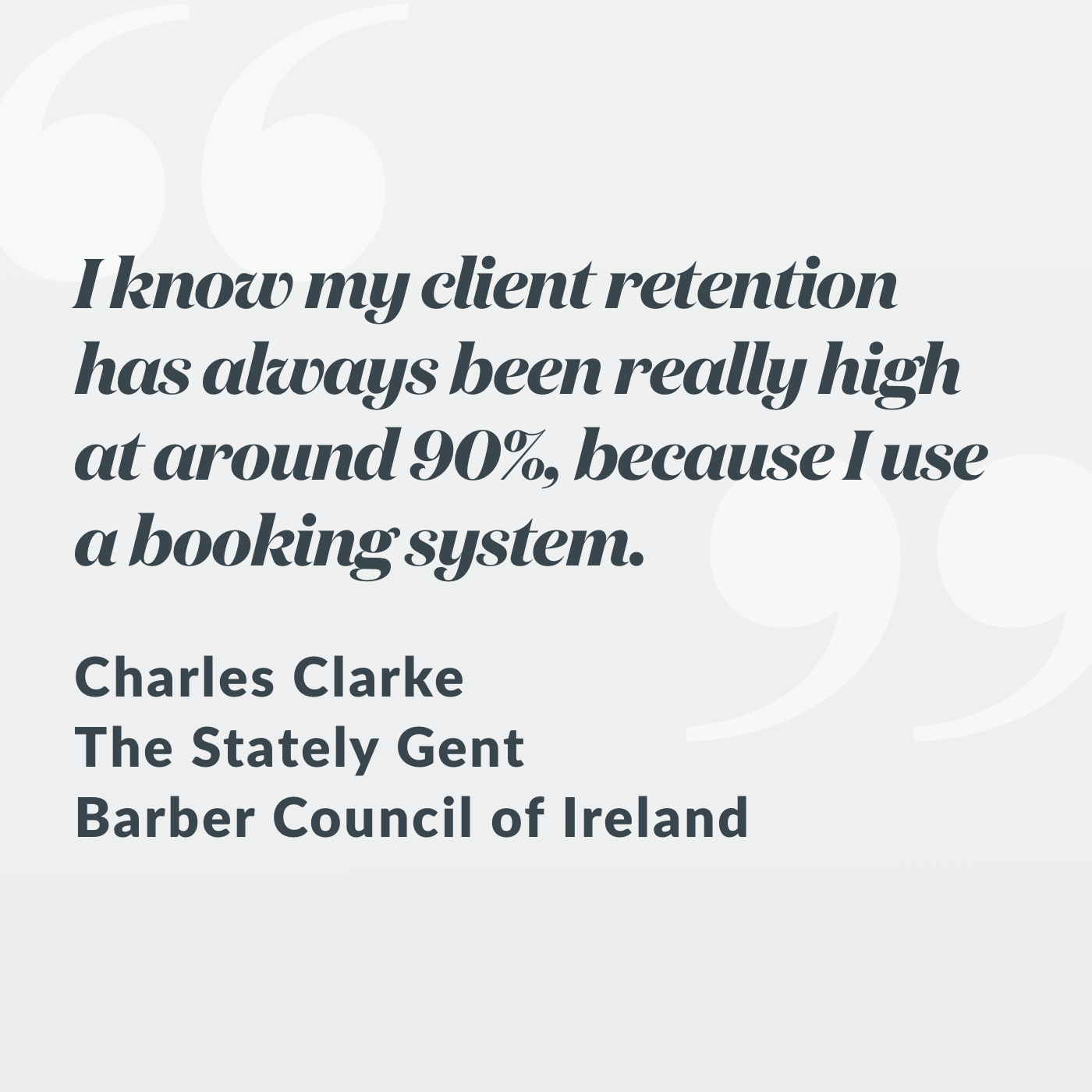
If you can’t see an overview of your client retention like I can with Timely’s reporting dashboards, you can’t forecast properly. Cash flow is sporadic, which is why I changed to taking appointments years ago – I was the only barber taking appointments in Ireland at the time!
What’s the main barrier for barbers to use a booking system?
Probably the cost. Clients are used to paying a cheaper rate, which obviously leaves less money to run the business. We need to change the customer perception that cheaper is better; they actually do need to pay more for a quality haircut. Barbers think if they up their prices, clients are going to go elsewhere. But that’s why then you need to up your game. Get your client experience, professionalism and services up to scratch. Provide the things your clients want, and will pay a premium for.
If you can get salon owners to think like business people, they’ll see the benefit of the booking system and what they can get out of it, rather than seeing it as an additional expense.
Tell us about your relationship with Timely
I’ve been using Timely for about 7 years now! I use Timely to not only manage my bookings, but also my SMS and email marketing and an accounting integration with QuickBooks. I’m working off an iPad at the moment and I have a seamless process from start to finish.
How does Timely compare with other booking systems you’ve used?
I’ve used quite a few systems over the years, and Timely is by far the most dynamic! The other systems I’ve used have been very expensive and they weren’t meeting my needs at all, and I had so many different issues. Using Timely, I quickly discovered that clients who weren’t very tech savvy found the Timely interface and the booking system very easy to use, which was a big win for me. Timely has everything that I need and it’s always one step ahead of where we need to be; I’m so impressed with it.
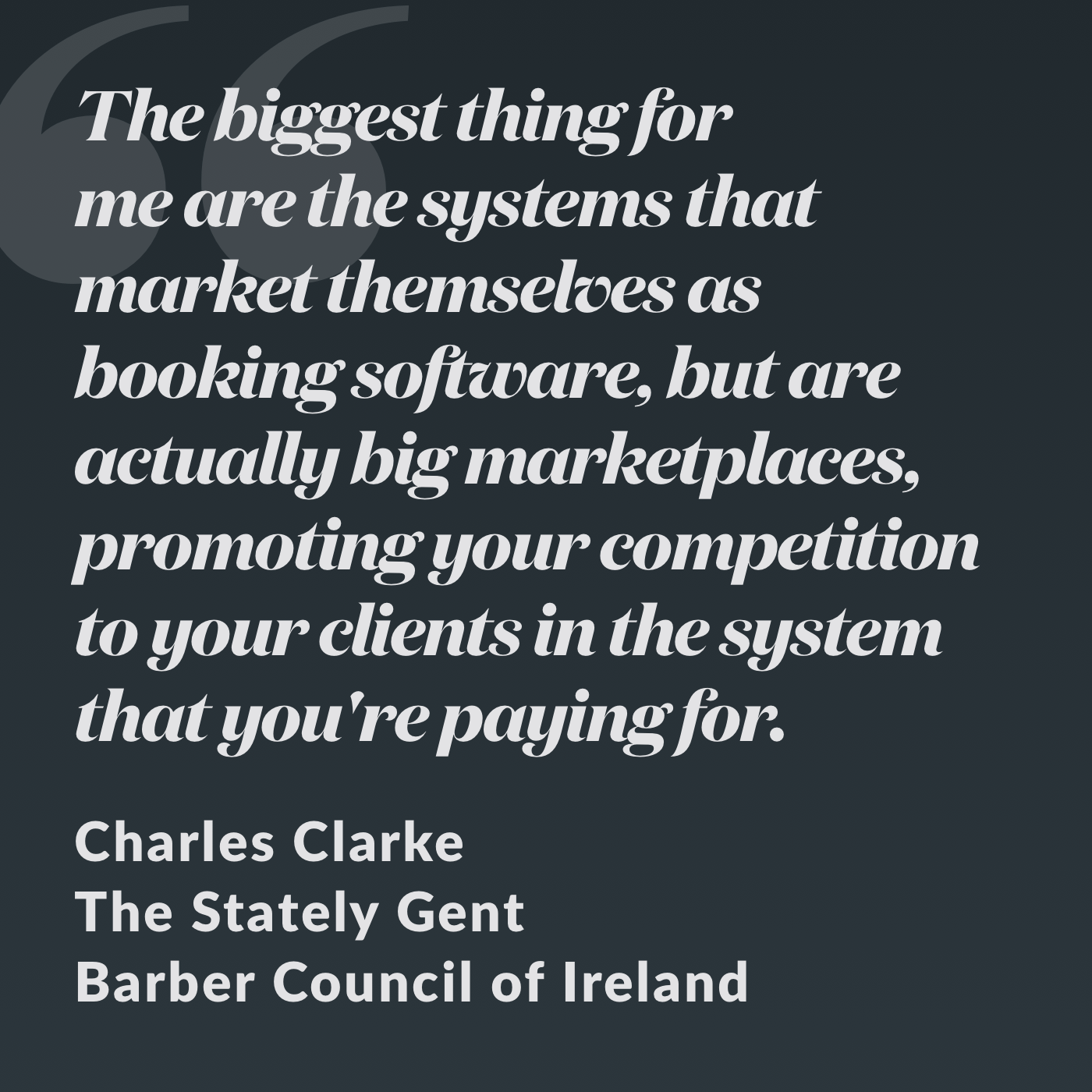
What are the most valuable Timely features for your business?
The Minimise Gaps feature has been a game-changer for us, where clients can only book in back to back so you don’t have any annoying calendar gaps. Online deposits and payment integrations are also great. I’ve now signed up to TimelyPay so when we reopen in Northern Ireland, clients will be able to pay online for the service, which reduces the risk of no-shows. Plus, using TimelyPay we can manage our online deposits and payments from within Timely, and it actually works out cheaper than using Stripe.
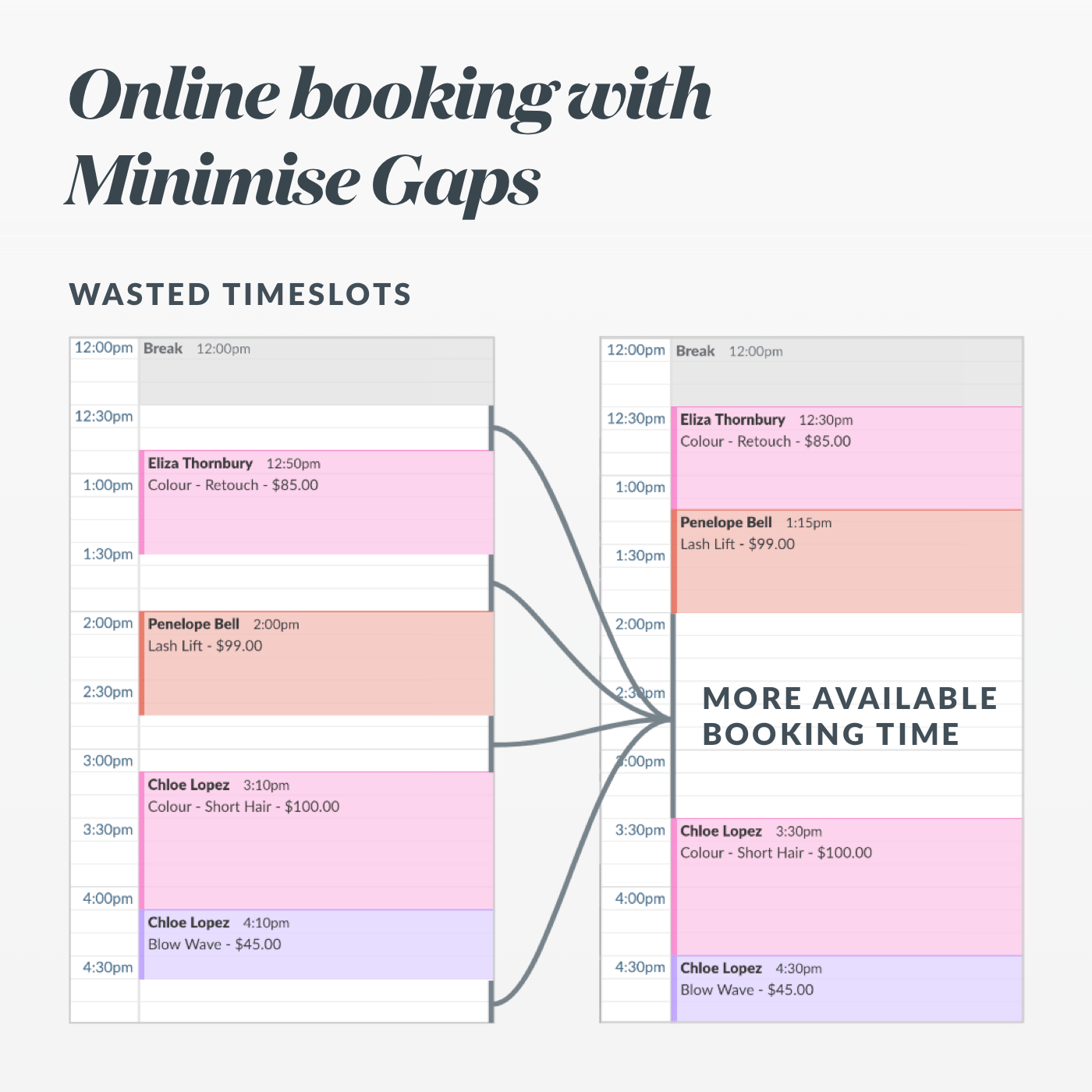
Other than deposits, how do you keep your no-shows down?
I get very, very few no shows, and I think it comes down to the SMS and email booking reminders, and rebooking reminders! I have it set up so that if clients haven’t rebooked after four weeks, we send them an automated email along the lines of “Hello, we’re here. Where are you?” and then after eight weeks, “Come back, please. What did we do wrong?”. I find that when those messages go out, I see a surge in bookings where clients are getting a reminder, because they don’t walk in and decide to spontaneously get a haircut.
How is your business handling the changes to the industry due to Covid?
There are new requirements coming from the state, and we’re going to need to be a lot more health and safety conscious when we can reopen, and be able to keep track of the clients coming in and out of the salon. We’re going to use the Consult app to carry out Covid specific consultations so we get all our client’s details before their appointment, and we can easily contact trace if we need to.
I’ve actually made up my own Covid consultation form already, so whenever a client makes a booking online, they’ll automatically be sent a confirmation SMS which will have the Covid form in it, which they can then fill in online.
Are those details valuable to your business outside of Covid?
Absolutely! We’ll be able to get details that they generally wouldn’t give out freely, like their date of birth and address. With that information we’ll gain a lot more insight as to where our clients are from, their demographic, and age groups etc, to use in our marketing and for forecasting.
We can also make some improvements to our client experience, like sending birthday messages! It gives us the power to understand who our biggest age group is, and who we need to be catering our experiences for, and we can also use that info to develop our business. It’s like being out fishing; if you’re out fishing and you’re throwing in the bait, then not every fish is going to take it, only the fish that it appeals to.
Some of the information that we’ll be able to get from Covid consultations is going to have a very powerful impact on our marketing strategies moving forward.
What are the different types of clients you’re getting at the moment?
At the moment, three are generally types of clients.
- Those who are complacent with Covid and lockdown.
- Those who are afraid, so they need to be assured that they are going to be safe when they come to your salon.
- Then you have the rest, who just aren’t prepared to come back.
About 15% of my clients are currently the complacent ones, 60% would be the clients who’re prepared to come if they’re safeguarded, and the other 25% just won’t come out.
This means that we need to understand our clients and how the human mind works, so we can adapt our businesses better. At the moment, clients are going to be loyal if they feel safe in your salon, and they’re not going to worry about having to pay a bit extra to get that. That’s where a booking system like Timely will help you to manage your business, especially off the back of Covid.


